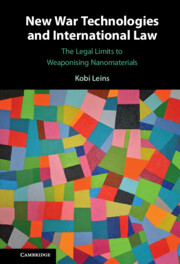Book contents
- New War Technologies and International Law
- New War Technologies and International Law
- Copyright page
- Dedication
- Contents
- Figures
- Acknowledgements
- Abbreviations
- Prolegomenon
- 1 International Law and the Use of Nanomaterials in War
- 2 The Three Technologies Using Nanomaterials
- 3 International Treaty Law
- 4 International Customary Law and Principles
- 5 International Environmental Law and Principles
- 6 International Human Rights Law
- 7 Conclusion and Recommendations
- Bibliography
- Index
7 - Conclusion and Recommendations
Published online by Cambridge University Press: 20 January 2022
- New War Technologies and International Law
- New War Technologies and International Law
- Copyright page
- Dedication
- Contents
- Figures
- Acknowledgements
- Abbreviations
- Prolegomenon
- 1 International Law and the Use of Nanomaterials in War
- 2 The Three Technologies Using Nanomaterials
- 3 International Treaty Law
- 4 International Customary Law and Principles
- 5 International Environmental Law and Principles
- 6 International Human Rights Law
- 7 Conclusion and Recommendations
- Bibliography
- Index
Summary
As early as 2008, Bill Gates expressed his concern to the Stockholm International Peace Research Institute regarding the potential use of various emerging technologies, including the use of nanomaterials, for security,
there is intensifying awareness around the world of the need to balance the obvious advantages of globalization with its increasingly apparent disadvantages … This conundrum applies across a widening spectrum of current and emergent technologies – such as nuclear technologies, but especially in the biological sciences, including genetic, engineering, synthetic biology and nanotechnologies.1
- Type
- Chapter
- Information
- New War Technologies and International LawThe Legal Limits to Weaponising Nanomaterials, pp. 194 - 216Publisher: Cambridge University PressPrint publication year: 2022



